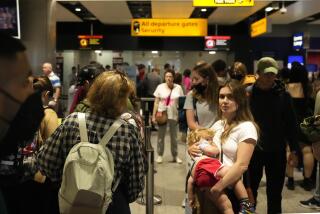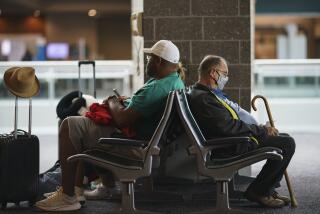TRAVEL INSIDER : Jet Lag? ‘Fast’ Remedy May Reduce Your Pain : Flying: Former airline executive suggests no food, drink, or non-prescription drugs on the day you travel.
- Share via
What every transoceanic traveler needs is an easy remedy for jet lag--those droopy, washed-out blahs that plague almost everyone for a few days after an overnight flight to Europe or Asia. A former airline executive, who has made more than 100 trips across the Atlantic, thinks he has come up with a common-sense approach to the problem.
The secret is to avoid all coffee, tea, alcohol, non-prescription drugs and food on the day you are flying, says Stephen F. Forsyth, president of Forsyth Travel Library, a travel book and map store in Shawnee Mission, Kan.
Skipping meals may seem a drastic sacrifice, but the reward is arriving at your destination feeling “refreshed and alive.” Yes, this even means refusing the dinner tray the flight attendants put before you and resisting the temptation for a nightcap, he says. From the time you wake up on the morning of flight day until just before your plane lands, you should eat nothing and drink only water and fruit and vegetable juices.
Obviously, a certain amount of discipline and determination are necessary. But jet lag “can ruin your trip,” says Forsyth, who once headed TWA’s Getaway Tour programs, “and can make your first several days abroad absolutely miserable.”
Forsyth defines jet lag as “the exhausted, run-down, disoriented feeling you experience after a long transatlantic flight. It is the feeling of missing a night’s sleep and being required to act the following day at 100 percent.” Add to this the stress of being in a new situation, and “some people shake and walk around with an inside tremble for several days.” Headaches, sleepless nights, an upset stomach and extreme fatigue during the day are other recognizable symptoms.
Forsyth makes no claims for the medical validity of his method. But it’s a technique, he says, that has worked for him and for hundreds of friends, colleagues and clients who have reported back to him that they followed his advice with success. Basically, it is designed for normally healthy travelers, like him, who in varying degrees experience the grim after-effects of an overnight flight through several time zones. People with health problems should consult doctors.
When he was younger, says Forsyth, who is now 50, he could ignore the symptoms of jet lag and “tough it out. But as I got older, jet lag got tougher.” About 10 years ago, he suffered so badly from the ill-effects of a flight to England--he could not fall asleep his second night in the country--that it ruined a five-day business trip. That episode convinced him to tackle the problem head-on.
Initially, he experimented with other potential jet-lag cures, which include regimens devised by medical authorities after years of research. One such theory suggests alternating periods of eating and fasting for several days before a flight. Another has found that jet lag can be reduced by regulating one’s exposure to sunlight. Whether they work or not, none is very practical for a harried traveler rushing to complete the last-minute tasks that inevitably precede a transoceanic journey.
For the past decade, Forsyth’s formula has worked well for him. In January, for example, he flew from Chicago to Glasgow on what he calls “the flight from Hell.” He rode in coach class, where several babies cried constantly, and a group of rowdy oil-field workers decided to party the entire trip. But, putting his method to the test, “I was still able to doze.” And when he landed, he was refreshed enough to travel another nine hours by train and car, eat a full dinner at his destination and go to sleep at 11 p.m. British time.
That night, “I slept for eight hours and woke at 7 a.m., ready for a new day,” he recalls. “It was a great trip, one of my best. Jet lag was nowhere to be found.”
Maybe the method won’t work for every traveler, or even most of them. But except for missing a few meals, it seems a fairly effortless way to try to combat jet lag--and at no cost. At best, you will succeed; at worst, you may lose a little weight because of the day’s diet. And at the outset of an overseas trip, that’s not so bad either.
Forsyth has made use of his remedy only on flights from the United States to Europe. Jet lag normally is not much of problem for him on the return trip, so he doesn’t skip meals. He has not yet tried it on overnight flights across the Pacific or to South America.
Some of the blame for the jet lag travelers suffer should be leveled at the airlines, says Forsyth, whose father preceded him at TWA as an executive.
“The airlines, in their highly competitive battles with one another, woo passengers with champagne, sumptuous hors d’oeuvres, rich food, cocktails, wine, coffee, high caloric desserts, after-dinner liqueur and mellow in-flight entertainments. Then, just when you would normally be heading into deep sleep at home, they rouse you up, give you coffee or tea, a sugar-rich pastry and kick you off the plane with no more than a short nap.
“Jet lag is guaranteed,” he says. “It’s a natural reaction.”
But, he insists, jet lag can be defeated--with “diligence, willpower and a little knowledge.”
To Forsyth, the body is a clock that is set at regular intervals by the daily routine of morning coffee, breakfast, lunch, cocktails, dinner and sleep. “Jet lag, for me, comes when I mess up the clock,” he says, which is what tends to happen on an overnight flight. So he skips meals on the day of the flight to “trick my body by not having a clock.” When he arrives in Europe, “I reset the clock to a new day.”
Here’s how he does it:
Before the Trip: On the evening before a transoceanic flight, Forsyth eats a full balanced dinner high in carbohydrates such as pasta. “I’ve been a runner for 10 years,” he says, “so I know about carbohydrate-loading as a store house for energy.”
People may think they can’t fly on an empty stomach, he says, but “the carbohydrates you loaded up on . . . will give you the energy you need to function.” You will be tired, but not run down, and moderately hungry, but not famished.
Day of the Flight: The most important rule, and the hardest one to adhere to, is to avoid all food, snacks, coffee, tea, non-prescription drugs and liquor. Instead, drink lots of fluids in the form of water and fruit and vegetable juices. Maintain this diet until the cabin crew awakens you for a breakfast snack just before the flight lands.
The biggest temptations will be the complimentary meal the airline will serve you and the drink cart passing by soon after the plane makes its evening departure. But because of time-zone changes, Forsyth says, indulging in a big meal and cocktails on an overseas flight is like going out on the town on a Saturday night and expecting to wake up bright and cheery at 2 a.m. Sunday morning.
In addition: Set your watch for the time at your destination. This will remind you that morning in Europe arrives five to eight hours before your body is expecting it. Relax. Watch the movie, listen to music, read a book, work crossword puzzles. If you are flying on business, put away the briefcase. Get comfortable. Get a pillow and blanket, put on a sweater to ward off the overnight cabin chill, loosen your shoes. Go to sleep. You might manage three or four hours, which is a big help in fighting jet lag. But don’t take sleeping pills.
Next Morning: When the cabin lights come on--about an hour before landing--Forsyth is one of the first passengers up and into the restroom. He quickly washes, brushes his teeth, shaves and changes his clothes, including underwear and socks.
Back in his seat, Forsyth is now ready to devour the airline’s breakfast snack, often a sugar-rich pastry, juice and coffee: “I’ll have two cups of coffee and eat everything they put in front of me.” If you follow Forsyth’s method, he says, you should feel remarkably awake and refreshed as the airplane makes its landing approach. In contrast, your fellow passengers will exhibit “bloodshot eyes, exhausted looks, wrinkled clothes, unshaven faces, tired expressions.”
But the battle is not yet won. Once you are on the ground: Treat yourself to a big breakfast. It is the first thing Forsyth does when he reaches his hotel. “I give my body back all the chemicals and nutrients that it normally gets and a few bonuses,” he says. “This resets my clock and I’m ready to go.”
Don’t take a nap. A nap reinforces the home-time body clock. Instead, be active. Soak up lots of sunshine: “Light helps your body adjust to time.” Look forward, not back. Keep your mind off what time it is at home, and don’t worry about adjusting to European time.
A free pamphlet, “Defeating Jet Lag” by Stephen F. Forsyth, can be obtained by sending a stamped, self-addressed business-size envelope to Forsyth Travel Library Inc., 9154 W. 57th St., P.O. Box 2975, Shawnee Mission, Kan. 66201.
Christopher Reynolds is on assignment. His column will resume next week.
More to Read
Sign up for The Wild
We’ll help you find the best places to hike, bike and run, as well as the perfect silent spots for meditation and yoga.
You may occasionally receive promotional content from the Los Angeles Times.






